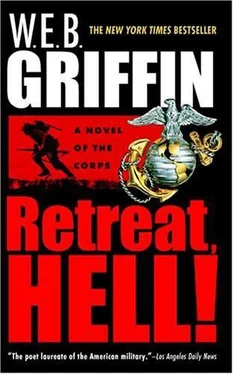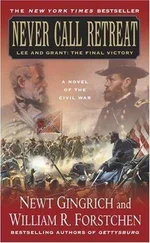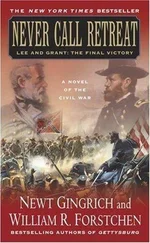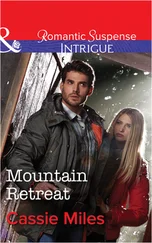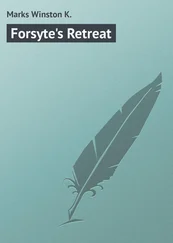"Al, could you call the airstrip and make sure Donald fuels the Big Black Bird?" McCoy asked.
"Done," Haig said.
Almond chuckled.
"You're speaking of Major Donald?" the general asked. "My former assistant Army Aviation officer? Now a member of your . . . organization?"
"Yes, sir."
"Have you got him wearing pajamas?"
"No, sir. He has more faith in his helo than I do."
" All things come to he who waits,' " Almond quoted. "I believe that."
"Sir?"
"The day General MacArthur ordered me to transfer those machines to you, and I told Major Donald, he was heartbroken that he would not be able to show me what a wonderful machine his new toy was. Now he can."
"Major Donald and the helicopters have been very useful, sir," McCoy replied.
"That's what he said, McCoy. He told me—and General MacArthur—that the helicopter was going to ... What exactly did he say? Oh, yes: 'usher in a new era of battlefield mobility.' "
"I've heard the sales pitch, sir. Many times."
Almond chuckled, then looked at him thoughtfully.
"How are they going to function in the snow, McCoy? In twenty-, thirty-degrees-below-zero weather?"
"I guess we're about to find out, sir."
"On the subject of your organization, McCoy, I've got to warn you that the commanding general of 1st MarDiv is looking for your scalp."
"Do you know why, sir?"
"Something about that company of Marines I borrowed to guard Major Donald's hangar in Seoul. He has been informed they won't be returning; that they are now members of your organization."
"Yes, sir, they are."
"He asked me if I knew anything about the transfer. I told him no. Then he said ... I don't think I'd better tell you what he said. But he did ask me to tell him if you ever showed up here."
"Their transfer was General Howe's idea, sir. His and General Pickering's."
"I have the feeling he suspects you were behind it," Almond said. "Or that I was and don't want to admit it."
"Why would he doubt your word, sir?"
"I have the feeling he's not in my legion of admirers," Almond said. "His primary purpose in coming to see me was to discuss . . . No. To be honest, it was to question, to request that I reconsider my orders to the 1st MarDiv. They've been ordered to proceed as quickly as possible past the Chosin Reservoir. ..."
"General Howe told me, sir. And he told me those were General Mac-Arthur's orders to you. That the quick dash to the border was not your idea."
Almond looked at McCoy for a minute.
"Let me explain something to you, Major," he said. "In case you ever find yourself far more senior and in a position like mine. The orders came from General MacArthur. When I got them— They came by officer courier, did General Howe tell you that?"
"Yes, sir."
"—I had the choice of saying 'Yes, sir' and carrying them out, or asking permission to discuss my questions, my doubts about them, with General MacArthur. I decided that General MacArthur had his reasons for the order, and that, my personal reservations about them aside, I had no grounds to ask him to reconsider them. When I made that decision, they became my orders. You can't tell a subordinate, 'Here's your orders. I don't like them much, but here they are. Don't blame me. They came from above.' I'm surprised you haven't learned that."
"I understand, sir."
"And since I gave my orders to General Smith regarding what I want the 1st MarDiv to do, I have had a chance to reflect on General MacArthur's orders to me. They were obviously based on General MacArthur's assessment of the situation. I remembered the doubts many people had about the Inchon Landing. The general was right then, and I must presume he made the correct decision in this instance."
"Yes, sir."
"His decision obviously was based on his consideration of the intelligence available to him. That intelligence concluded—General Willoughby concluded—there is only a very remote possibility that the Chinese will enter this conflict. When General MacArthur accepted General Willoughby's conclusions, it became his conclusion. A Corps Commander is not permitted to question conclusions drawn by the Supreme Commander. You following me, Major?" Yes, sir.
"Only a superior headquarters can question the Supreme Commander's judgments. And a subordinate organization commander cannot go over the head of the Supreme Commander to make his doubts known to higher headquarters."
"Yes, sir."
Almond looked at him again for a long moment.
"I don't know what we're going to find when we get to the 3d ROK, Major McCoy. But I'm not going to comment on whatever we do. I want to be in a position—and I want you to be in a position—to be able to truthfully state that whatever you report to your superiors was in no way influenced by me."
"Yes, sir. I understand."
McCoy got one final long look.
"I really hope you do, McCoy," he said, finally. "Now, if you've finished your breakfast, why don't we see what's going on at the 3d ROK Division?"
[THREE]
Headquarters, 3d ROK Division
Eleven Miles Southeast of East Shore, Chosin Reservoir
O8O5 3O October 195O
McCoy had suggested—and General Almond had quickly agreed—that the Corps Commander should ride in the copilot's seat "because he could get a better look at the terrain from there."
McCoy rode in the passenger compartment with Captain Haig, an ROK major named Pak Sun, and two X Corps Military Policemen armed with Thompson submachine guns. With the exception of Haig, no one had ever ridden in a helicopter before, and it was obvious—at least at first—that they were more afraid of the helicopter than they were of the prospect of meeting the enemy.
Major Sun shouted in McCoy's ear, over the roar of the engine, announcing that he had attended the University of California, Los Angeles, on a swimming scholarship. McCoy just nodded and smiled.
The flight took about fifteen minutes, and as they made their approach, McCoy saw a Cessna L-19, with the X Corps' blue-and-white "X" shoulder patch painted on the engine nacelle. The small, high-wing observation aircraft was flying a circular pattern around the landing strip, which was a gravel "paved" road running parallel to the line of rocky hills on which the 3d ROK Division had set up its defensive positions.
He wondered if the airplane was there on orders, in case it was required to provide something, or whether the pilot was just curious about the black, unmarked H-19.
An ROK major general in a surprisingly natty fatigue uniform was waiting for them with a driver and two MPs in a highly polished jeep.
Major Sun began to translate the introductions, and presented Major General Lee Do, ROK, to Major General Edward M. Almond, USA. General Almond looked at McCoy with a question on his face. McCoy shook his head no, and Almond said, "Leave Major McCoy out of this, Sun."
Sun nodded his head in acknowledgment and McCoy was not introduced.
General Almond said he wanted to go up the hill, to the emplacements, to see for himself what was going on.
"Do you want to go, McCoy?"
Instead of replying directly, McCoy turned to the ROK general.
"General," he asked in faultless Korean, "where are you keeping your prisoners?"
Major Sun was as surprised that McCoy spoke Korean as was the ROK general.
The ROK general pointed down the road. McCoy saw the prisoners, and the moment he saw them—both from the bones of their faces and their quilted cotton uniforms—he knew they were Chinese.
"They don't look Korean to me, sir," McCoy said to Almond. "With General Do's permission, I think I'll go talk to them."
"I think it's best you do that alone, Major McCoy," Almond said.
Читать дальше
